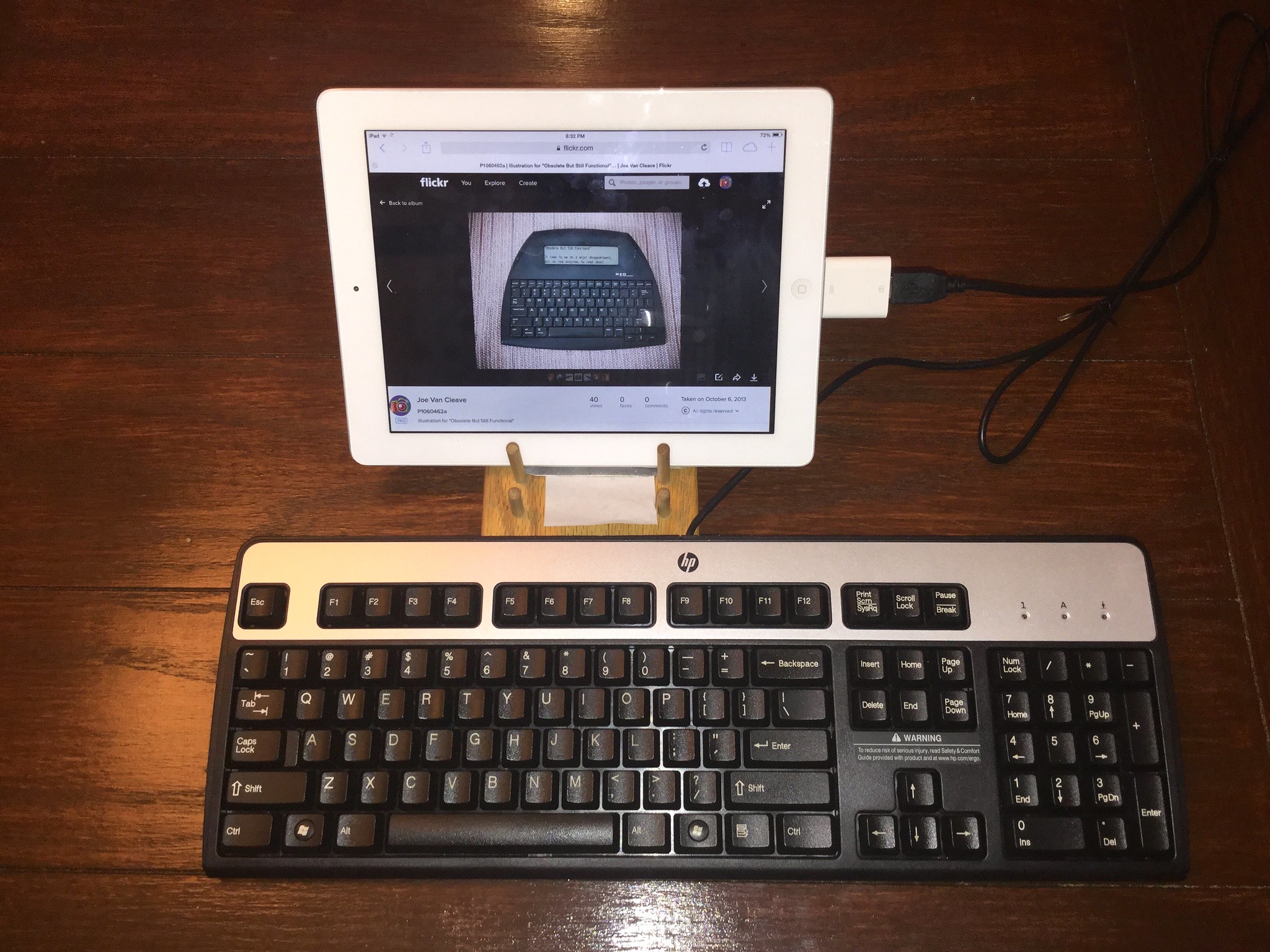Some Thoughts on Electronic Typewriter Alternatives

I uploaded a video today describing the usefulness of the AlphaSmart Neo, text-editor based keyboard device, as an alternative to the direct typewriter experience. This idea will come as no surprise to people who are already familiar with these paperless, electronic writing tools, but for others who aren't, this might come as a shock, even blasphemy. I offer no apologies, only my personal viewpoint to the contrary.
In the video, I explain my feelings as to the essence of what the writing-with-a-typewriter experience is all about, for me. To some, it might have to do with the pre-computer legacy of the typewriter, or to others it might be the mechanical, direct ink-to-paper aspect of typewriters. Those are all valid reasons to prefer typewriters to other forms of writing methods, ones to which I can heartily attest as an incurable typewriter fanatic.
But for the actual experience of writing using a typewriter, I find these three aspects most unique and attractive: 1) Non-distractive writing; 2) Mechanical interface; 3) Single-purpose use. There are other aspects of typewriters worth appreciating, but these three I feel capture in essence what many others, throughout the past decades, have expressed as their primary reason for preferring typewriters over other forms of writing.
It is helpful to remind ourselves that, for a long period of time, typewriters were the only form of mechanized writing accessible to the common person. Certainly by the 1960s there were a handful of writers who gained access, through special circumstances, to word processor programs hosted on mainframes or mini-computers; but it wasn't until the mid- to late-1970s that the personal computer platform became sufficiently capable and affordable for access by the mainstream public as a writing device. Once that happened, writing technology was quickly transformed.
Interestingly, we really didn't hear much about computer-based word processors being a distraction to the writing experience until personal computer platforms became sufficiently capable to host other, more distractive, features such as games and the Internet. This has become most notable since the advent of widely available wireless Internet accessibility.
I'd like to argue in favor of mechanical keyboards connected to distraction-free text entry systems as being essentially typewriter-like. Broadly speaking, if a computing platform, dedicated to a word processor or text-entry program, is not typewriter-like, then electric typewriters shouldn't be considered as typewriters either. An early personal computer, lacking distractive software other than a few 8-bit graphic games, and connected to a mechanical-feeling keyboard and line printer, is essentially an electric typewriter in function, that lacks the compactness of a predecessor technology such as the IBM Selectric, whose components fit all in one package instead of scattered over the work surface of a desk. Was an early word processor computer overly complex? Yes, certainly. Ungainly? Yes, without doubt. Non-portable? Other than the Osborne luggable computers and their ilk (which lacked a built-in printer), yes. But were they functionally like electric typewriters? Certainly; and would also permit text editing.
By the time we get to the 1980s and the daisy-wheel electric typewriter, some of which offered limited text editing via a single-line LCD screen and memory buffer, we have what is essentially the mess of an early word processor personal computer, keyboard and printer, that would have otherwise covered the entire working surface of an office desk, all jammed into one small enclosure; light and small enough to lug around, but still requiring to be plugged into an electric outlet to function.
So, I think it's fair to say that electric typewriters, though different in some respects to manuals, deliver a genuine typewriter writing experience; and I will also argue that any technology that delivers a sufficient similarity of writing experience should be considered electric typewriter-like.
I know what you skeptics are thinking, this guy's trying to use convoluted logic to convince himself that computers are typewriters and therefore should be considered the same. Actually, no. I've written with both typewriters and computers, as have many of you. Computers are fine for final polish of a document; and considering that there are few publishers left who will accept manuscripts in typescript form on paper, a writer has little option but to, at some point in the writing process, employ that demon computer.
But few of us are writers; fewer still are published. Yet what's most important in those crucial early stages of the writing process is to employ tools that reduce distraction and focus the writer to the task at hand. Non-distractive systems, in whatever form they be, are often preferred. Does that mean all professional writers use non-distractive systems like typewriters in some part of their writing process? Probably not; I'd wager that many writers whose output is measured in several books per year have disciplined themselves to using computers as their preferred writing tool, without falling into the pitfalls that computers can offer, simply for the efficiency of the word processor. It's a matter of discipline and focus. For the professional, it's their livelihood at stake; of course they'd be able to figure out how not to be tempted by Instagram, Twitter and YouTube cat videos.
For a person like me, a typewriter fanatic and also fledgling, amateur writer, I find advantage to both typewriter and word processor. It's the foibles of the computer platform that host most word processor applications that gets me. For many of us, we've found devices like the AlphaSmart text editing keyboards to be almost ideally suited to that early writing phase, due to its non-distractive nature, portability, excellent feeling keyboard and world-class battery life. We should remind ourselves that even 1980s-era, line-editing, electric daisywheel typewriters had within their innards some form of micro-processor. Certainly the AlphaSmarts do, too. So I think it's fair to say that computers, in the most broad application of that term, are not intrinsically writer-unfriendly. Rather, it's the crudeness of general-purpose computer operating systems that draws the ire of typewriter aficionados like myself and others.
It would be nice if devices like the AlphaSmart Neo were still being manufactured, but they aren't. I purchased mine in 2010, for under $100. At that time, laptop computers with all their distraction were selling for around ten times that amount. Today, a person looking for a dedicated electronic writing experience that offers a text file output has few alternatives. One such alternative is to purchase a used Neo online, and risk receiving someone's broken device with no factory support, other than software uploads from Renaissance Learning. Another alternative is the Hemingwriter device, but it, though costly, is less capable than an AlphaSmart, as it lacks text edit capability. A third option is someone on Etsy selling what he calls a Write-O-Tron, an Arduino-based dedicated word processing system built into a wooden cigar box, that costs about the same as the Hemingwriter.
I would like to propose another alternative, one that lacks some of the advantages of the AlphaSmarts but does offer a distraction-free writing experience (with one cavaet) and an excellent-feeling, truely mechanical keyboard. That is to pair a true mechanical keyboard with a small iOS tablet device like an iPad Mini or, better yet, iPod Touch.
I'm working on building such a system. This piece was written with the first iteration, that being a full-sized desktop computer keyboard (one I had laying around in storage) paired with an old iPad 2 sporting the IAWriter app. I'm going to be replacing this large keyboard with a so-called "60%" mechanical keyboard (that should be arriving this week), and the iPod Touch I've already been using for editing photos and videos.
If you had to purchase this system new (I already had the iPad 2 and old desktop keyboard, so their cost was essentially free), you'd spend about $250 for a 32GB iPod Touch and about $100 for a true mechanical keyboard (or a lot less for a larger, standard desktop keyboard); still somewhat less than either the Hemingwriter or Write-O-Tron, but with much more capability. Or maybe you already have an iPhone; all you need is the mechanical keyboard, and the discipline to put it into "airplane" mode for a few hours (the secret to non-distractive writing on iOS devices).
Yes, you can get Bluetooth wireless keyboards for iOS devices; but these lack the feel of a true mechanical keyboard (remember that typewriter-like writing experience we're after?) and being wireless means they'll end up sucking the battery life out of your iOS device. Keep your iOS device in "airplane" mode and the Bluetooth turned off and its battery will last for many hours, sufficient to get your writing done for the day. And using a smaller, "60%" keyboard means full-sized mechanical keys in a much smaller, more portable package.
An AlphaSmart Neo isn't a replacement for a true typewriter, because direct mechanical type to paper is an experience unique unto itself. I'll never get rid of my typewriter collection (though its numbers might fluxuate up or down over the years); likewise, I hope to have my Neo for many years into the future, because it's such an excellent portable first-draft writing tool. But being electronic, and no longer manufactured or supported, means I need to find some kind of functional alternative. I think a mechanical keyboard mated to an iOS tablet device might be that alternative. I'll keep you posted on my findings.
Labels: AlphaSmart Neo, hybrid typewriters, typewriter collecting, typewriter renaissance, Typewriter video series, word processors

3 Comments:
Joe- very thorough video, great audio and editing. I purchased an AlphaSmart 3000 a while back- it's a great, portable alternative to a laptop for distraction free writing - as you said. Keep those vids coming, thanks. ~Tom~
Joe -- great video. I started out with a Alphasmart 3000 but I didn't really care for that model. It seemed the keys were sticky and not very responsive. I bought a Neo to replace it (selling the 3000 on eBay for what I paid for it) and the Neo is a marvelous product. When I read that they weren't going to make them anymore I picked up a Neo2. Now I just need to put them to use .... there lies the conundrum.
Thanks For Sharing Such A Nice Information! Please Check This Out - typewriter mechanical keyboard
Post a Comment
<< Home